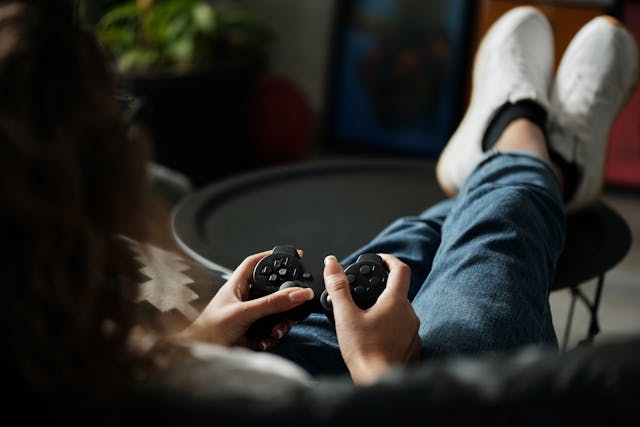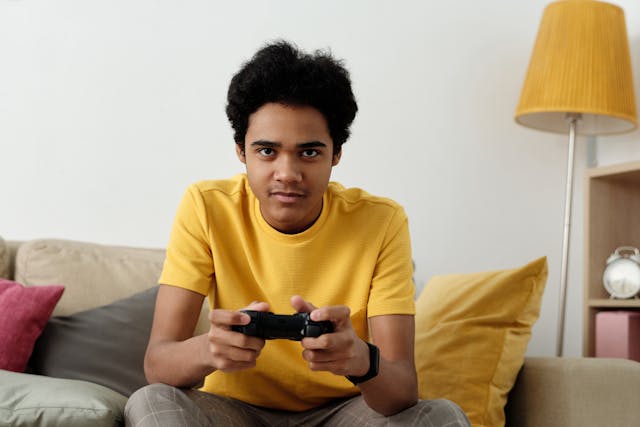The Impact of Video Games on Mental Health: Benefits and Concerns
Video games have become an integral part of modern entertainment, enjoyed by millions of people across the world. While often associated with fun and relaxation, their influence on mental health is a topic of ongoing discussion. As gaming continues to evolve, so does the understanding of its impact, both positive and negative. In this article, we’ll explore the benefits of video games for mental health as well as the concerns they may raise.

The Positive Effects of Video Games on Mental Health
Stress Relief and Relaxation
Many gamers use video games as a way to unwind after a long day or to escape from life’s stresses. Video games offer a form of distraction that helps to alleviate tension and anxiety. Immersing oneself in a fictional world allows players to temporarily set aside their worries and focus on a new experience, often leading to reduced stress levels.
Improved Cognitive Function
Playing video games can enhance several cognitive skills. Action games, in particular, have been shown to improve reaction time, attention to detail, and problem-solving abilities. Puzzle games and strategy-based games help sharpen memory, multitasking, and decision-making. These mental exercises contribute to overall cognitive health and can even have therapeutic uses for individuals with cognitive impairments.
Social Connections and Community Building
Online multiplayer games provide players with the opportunity to interact with others across the globe, forming friendships and communities. These social interactions can be especially beneficial for individuals who may feel isolated in real life. Virtual communities offer a sense of belonging and support, allowing players to share experiences and bond over common interests. This connection has been shown to improve mental well-being, particularly for people dealing with loneliness or social anxiety.
Emotional Resilience and Achievement
Many games are designed with challenges that require perseverance, strategic thinking, and skill to overcome. Successfully completing a difficult task or reaching a new level can give players a sense of accomplishment and boost self-esteem. In turn, this can help build emotional resilience, as players learn to cope with setbacks and frustration in a controlled environment.
The Potential Negative Effects of Video Games on Mental Health
Addiction and Compulsive Gaming
One of the most significant concerns regarding video games is the risk of addiction. Excessive gaming, particularly in immersive multiplayer games, can lead to compulsive behavior and negatively impact daily life. Individuals may prioritize gaming over work, school, or personal relationships, leading to neglect of essential responsibilities and social isolation. In severe cases, gaming addiction can contribute to mental health issues such as depression and anxiety.
Increased Anxiety and Stress
While video games can relieve stress for many, they can also contribute to anxiety and stress for others, especially when the gameplay is too intense or competitive. Games that feature high-stakes scenarios, time pressure, or constant threats can trigger anxiety, particularly for individuals prone to stress. In some cases, prolonged exposure to these stressors within a gaming context may increase overall anxiety levels.
Aggressive Behavior and Desensitization to Violence
Another concern is the potential for violent video games to encourage aggressive behavior. Some studies suggest that exposure to violent content can desensitize players to real-world violence and contribute to aggression. While the evidence is mixed, critics argue that the constant portrayal of violence in games could influence individuals, particularly younger players, in ways that affect their behavior and emotional regulation.
Sleep Disruption
Excessive gaming, particularly late at night, can disrupt sleep patterns and contribute to sleep deprivation. Many people become so engaged in games that they lose track of time, playing well into the night. Poor sleep can lead to various mental health problems, including mood swings, irritability, and difficulty concentrating. Additionally, the blue light emitted by screens may interfere with the body’s natural sleep cycle, making it harder for individuals to fall asleep.

Finding a Balance: Healthy Gaming Habits
Given the potential benefits and drawbacks of video games, it’s important to establish a healthy balance. Here are a few strategies to maximize the positive effects while minimizing the risks:
Set Time Limits
Establishing clear boundaries for how much time is spent gaming each day can help prevent the negative consequences of excessive play. Setting aside time for other activities, such as exercise, socializing, and work, ensures that gaming doesn’t become a dominant force in daily life.
Choose Games Wisely
Not all video games are created equal, and the type of game played can have a significant impact on mental health. Opting for games that encourage relaxation, creativity, or social interaction can contribute to overall well-being. On the other hand, avoiding games that induce stress or feature aggressive content may reduce negative mental health outcomes.
Practice Self-Awareness
Players should regularly assess how gaming makes them feel. If they notice that gaming is negatively impacting their mood, relationships, or mental health, it may be time to take a break or seek professional help. Practicing mindfulness and reflecting on gaming habits helps individuals stay in control of their gaming experience.
Balance with Other Activities
It’s essential to balance gaming with other activities that promote physical and mental well-being. Regular exercise, healthy eating, and engaging in face-to-face social interactions can offset any potential negative effects of gaming, contributing to a healthier lifestyle overall.
Conclusion: Video Games as a Tool for Mental Health
Video games are not inherently harmful to mental health, but their impact depends on how they are used. When played in moderation and with thoughtful intention, video games can offer numerous benefits, such as stress relief, cognitive improvement, and social connection. However, like anything, excess can lead to negative outcomes, including addiction and emotional distress.
The key is finding a balance—using video games as a tool for relaxation, socializing, and cognitive enhancement, while being mindful of the time spent and the content consumed. By practicing healthy gaming habits, individuals can enjoy the many positive aspects of gaming without sacrificing their mental health.












